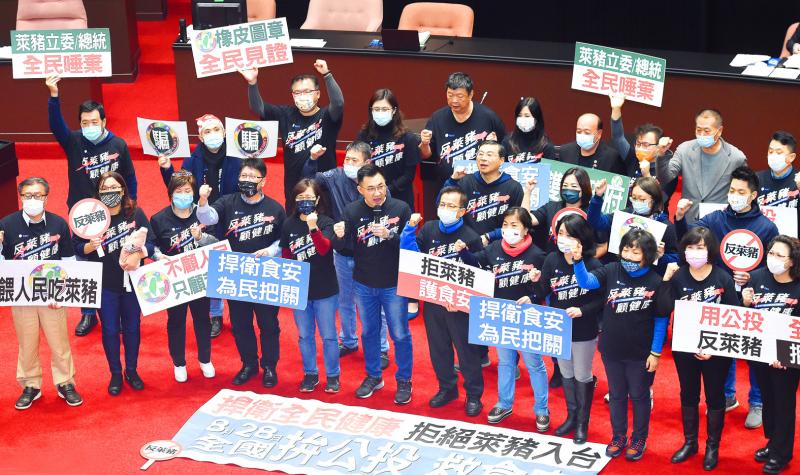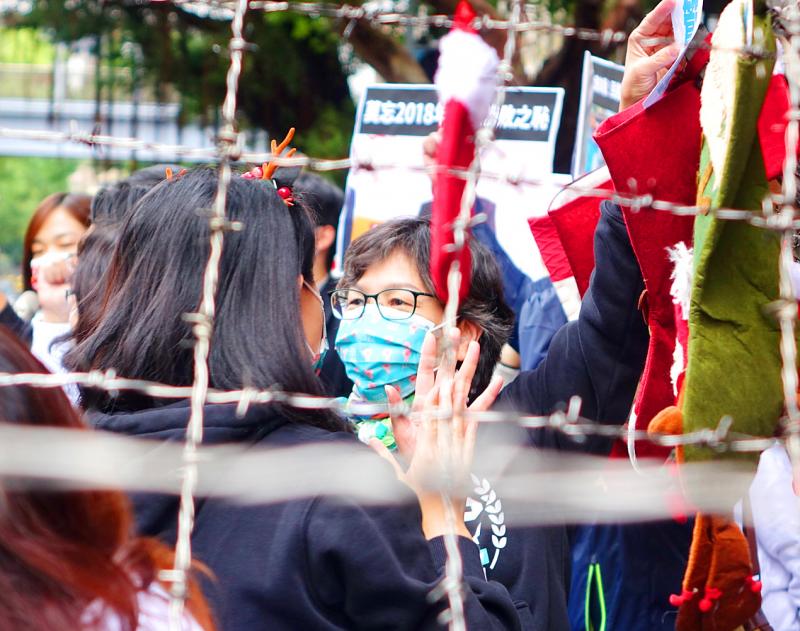Nine administrative directives to lift restrictions on imports of pork products containing ractopamine residue, as well as US beef from cattle 30 months or older, were approved yesterday, with the Democratic Progressive Party (DPP) prevailing, given its majority in the legislature.
The results pave the way for Taiwan to allow imports and sales of such US pork and beef products from Friday next week.
DPP lawmakers, who hold 61 of the 113 seats in the Legislative Yuan, voted to pass the nine directives, which included regulations on ractopamine residue levels; labeling of the origin of pork products; quarantine and examination procedures for imported beef; and rules for imports of US and Canadian beef.

Photo: Liao Chen-huei, Taipei Times
Opposition lawmakers from the Chinese Nationalist Party (KMT) and the Taiwan People’s Party (TPP) voted against the directives.
The New Power Party (NPP) said that it has concerns about public health issues and food safety.
Taiwan Statebuilding Party Legislator Chen Po-wei (陳柏惟) and independent Legislator Freddy Lim (林昶佐) sided with the DPP.

Photo: Wang Yi-sung, Taipei Times
As of press time last night, the legislative session was still ongoing.
Lawmakers were to vote on supplementary bills and amendments to improve controls and evaluations of product labeling, inspections, and enhanced food safety protocols ahead of implementation of the nine directives.
The first directive was to set residue limits for feed additives and supplements on all meat.
The opposition focused on ractopamine, a leanness-enhancing agent for cattle and hogs by some farming operations.
In 2012, the then-KMT administration passed laws for ractopamine levels in imported beef, stipulating a maximum residue level of 0.01 parts per million (ppm).
Lawmakers yesterday approved legislation to permit imports of US pork at the same level.
A ban on the use of ractopamine in domestic farming operations remains in place.
The directives were introduced shortly after President Tsai Ing-wen (蔡英文) on Aug. 28 announced that the government would lift the bans on pork containing ractopamine and beef from cattle more than 30 months old.
Eight of the directives came from the Ministry of Health and Welfare to adjust food safety regulations regarding feed additive and veterinary drug residues, as well as rules for labeling of packaged pork products to show their origin or to indicate that it is for food suppliers.
Another ministry directive was to update quarantine and examination procedures for imported beef.
There were dissenters within the DPP, with legislators Lin Shu-fen (林淑芬), Liu Chien-kuo (劉建國) and Chiang Yung-chang (江永昌) abstaining over amendments to the School Health Act (學校衛生法) and other issues.
They cited reservation over imports of US pork raised by their constituents and local hog farmers.
Over the past few weeks, Lin has expressed doubt that promises of effective management could be kept.
She proposed her own amendments, including stronger labeling and inspection rules, as well as restrictions on such meat being used for school meals.
“If our party punishes me for upholding my principles, I will accept it,” Lin said.
“I am at ease with my stance,” Liu said.
NPP caucus whip Chiu Hsien-chi (邱顯智) said of his party’s defeated proposals: “It is regretful to see our proposed legislation rejected.”
“Even our proposal to increase fines for breaches of the regulations did not pass, depriving the public of the basic right to choose,” Chiu said.
TPP caucus whip Lai Hsiang-ling (賴香伶) said that she was disappointed about the results.
She urged people to use their vote to express their anger.
KMT caucus deputy secretary-general Cheng Li-wun (鄭麗文) said: “DPP legislators have castrated themselves by going against the public will.”
“They are a rubber-stamp team and the party has become a ‘ractopamine pork’ entity,” she said.
Additional reporting by Chen Yun and CNA

CHAOS: Iranians took to the streets playing celebratory music after reports of Khamenei’s death on Saturday, while mourners also gathered in Tehran yesterday Iranian Supreme Leader Ayatollah Ali Khamenei was killed in a major attack on Iran launched by Israel and the US, throwing the future of the Islamic republic into doubt and raising the risk of regional instability. Iranian state television and the state-run IRNA news agency announced the 86-year-old’s death early yesterday. US President Donald Trump said it gave Iranians their “greatest chance” to “take back” their country. The announcements came after a joint US and Israeli aerial bombardment that targeted Iranian military and governmental sites. Trump said the “heavy and pinpoint bombing” would continue through the week or as long

TRUST: The KMT said it respected the US’ timing and considerations, and hoped it would continue to honor its commitments to helping Taiwan bolster its defenses and deterrence US President Donald Trump is delaying a multibillion-dollar arms sale to Taiwan to ensure his visit to Beijing is successful, a New York Times report said. The weapons sales package has stalled in the US Department of State, the report said, citing US officials it did not identify. The White House has told agencies not to push forward ahead of Trump’s meeting with Chinese President Xi Jinping (習近平), it said. The two last month held a phone call to discuss trade and geopolitical flashpoints ahead of the summit. Xi raised the Taiwan issue and urged the US to handle arms sales to

BIG SPENDERS: Foreign investors bought the most Taiwan equities since 2005, signaling confidence that an AI boom would continue to benefit chipmakers Taiwan Semiconductor Manufacturing Co’s (TSMC, 台積電) market capitalization swelled to US$2 trillion for the first time following a 4.25 percent rally in its American depositary receipts (ADR) overnight, putting the world’s biggest contract chipmaker sixth on the list of the world’s biggest companies by market capitalization, just behind Amazon.com Inc. The site CompaniesMarketcap.com ranked TSMC ahead of Saudi Aramco and Meta Platforms Inc. The Taiwanese company’s ADRs on Tuesday surged to US$385.75 on the New York Stock Exchange, as strong demand for artificial intelligence (AI) applications led to chip supply constraints and boost revenue growth to record-breaking levels. Each TSMC ADR represents

Pro-democracy media tycoon Jimmy Lai’s (黎智英) fraud conviction and prison sentence were yesterday overturned by a Hong Kong court, in a surprise legal decision that comes soon after Lai was jailed for 20 years on a separate national security charge. Judges Jeremy Poon (潘兆初), Anthea Pang (彭寶琴) and Derek Pang (彭偉昌) said in the judgement that they allowed the appeal from Lai, and another defendant in the case, to proceed, as a lower court judge had “erred.” “The Court of Appeal gave them leave to appeal against their conviction, allowed their appeals, quashed the convictions and set aside the sentences,” the judges